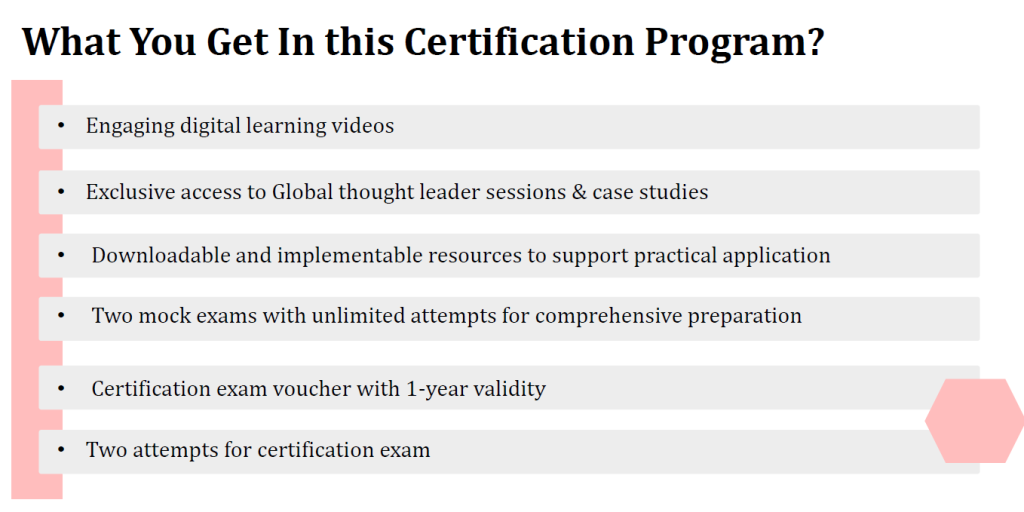Description
Global Certification Program
- E-Learning
- Globally lifetime Valid Certification
- Lifetime Valid Certification
- AI based Roleplay & Simulations
- Two Exam Attempts
Certified Blockchain Architect (CBA)
In today’s rapidly evolving technological landscape, the GSDC Certified Blockchain Architect (CBA) certification stands as a testament to your expertise in the field of blockchain architecture. By passing this certification exam, you demonstrate your wealth of knowledge and practical skills in designing and implementing blockchain solutions.
This certification recognizes the profound importance of blockchain technology, which is revolutionizing industries worldwide by enabling secure and transparent transactions, enhancing trust, and fostering decentralized systems.
As a certified blockchain architect, you possess the ability to develop secure and efficient blockchain networks, positioning yourself as a highly sought-after professional in this transformative field.
Learning Objective
❑ Master blockchain architecture fundamentals for innovative solutions.
❑ Gain expertise in smart contract development and auditing.
❑ Become proficient in blockchain consensus mechanisms.
❑ Harness the power of blockchain for business transformation
❑ Design and implement secure and scalable blockchain networks.
❑ Develop skills to integrate blockchain with existing systems.
❑ Understand regulatory and legal considerations in the blockchain
Curriculum
1.Common use cases for public blockchains
• Open, decentralized networks
• Cryptocurrencies & DeFi applications
• Transparent & immutable records
2.Common use cases for private & permissioned blockchains
• Restricted access control
• Enterprise and supply chain use
• Enhanced data privacy & compliance
3.Consensus algorithms: variety and selection
• Multiple models (PoW, PoS, etc.)
• Trade-offs: security, scalability, energy
• Criteria for choosing the right algorithm
4.What is needed to launch your own blockchain
• Infrastructure & node setup
• Protocol and network configuration
• Smart contract integration
5.Common problems & considerations in public blockchains
• Scalability challenges
• High transaction fees
• Security vulnerabilities (e.g., 51% attacks)
6.Awareness of the tech behind common blockchains
• Cryptography & hashing techniques
• Distributed ledger and P2P networks
• Data integrity (e.g., Merkle trees)
7.When is mining needed and when it is not
• Essential for PoW systems
• High energy and cost implications
• Alternatives with non-mining consensus
8.Security in blockchain
• Cryptographic safeguards
• Threats (e.g., Sybil attacks, smart contract bugs)
• Best practices for network resilience
9.The programming languages of the most common blockchains
• Solidity for Ethereum
• Go, Python, JavaScript, etc.
• Tools for development and debugging
10.Typical deployment & testing procedures
• Node configuration & network setup
• Unit, integration & stress testing
• Automated deployment frameworks
11.When to use blockchain with Hyperledger
• Enterprise-grade, permissioned networks
• Modular, scalable architecture
• Ideal for finance & supply chain use cases
12.When to use blockchain with Ethereum
• Public blockchain with smart contracts
• DApp and DeFi ecosystem
• Considerations: gas fees & scalability
13.Which blockchain platform to choose when
• Comparative analysis of features
• Security, scalability, and cost factors
• Real-world case study insights
14.When to create a Consortium blockchain
• Collaborative, multi-organization networks
• Shared governance & reduced costs
• Enhanced privacy for partners
15.Front ends for blockchain applications
• Integration with smart contracts
• Frameworks like Web3.js & Ethers.js
• Focus on UI/UX for DApp development
16. Tools, Certification Readiness, and Real-World Case Studies
• Developer tools: CLI utilities, testing environments, blockchain explorers
• Implementation checklists for public and private blockchain launches
• Smart contract audit checklists and security review frameworks
• Practice exercises and mock scenarios for blockchain certifications
• In-depth case studies: DeFi platforms, enterprise blockchain, consortium use
• Capstone projects to demonstrate real-world blockchain implementation







